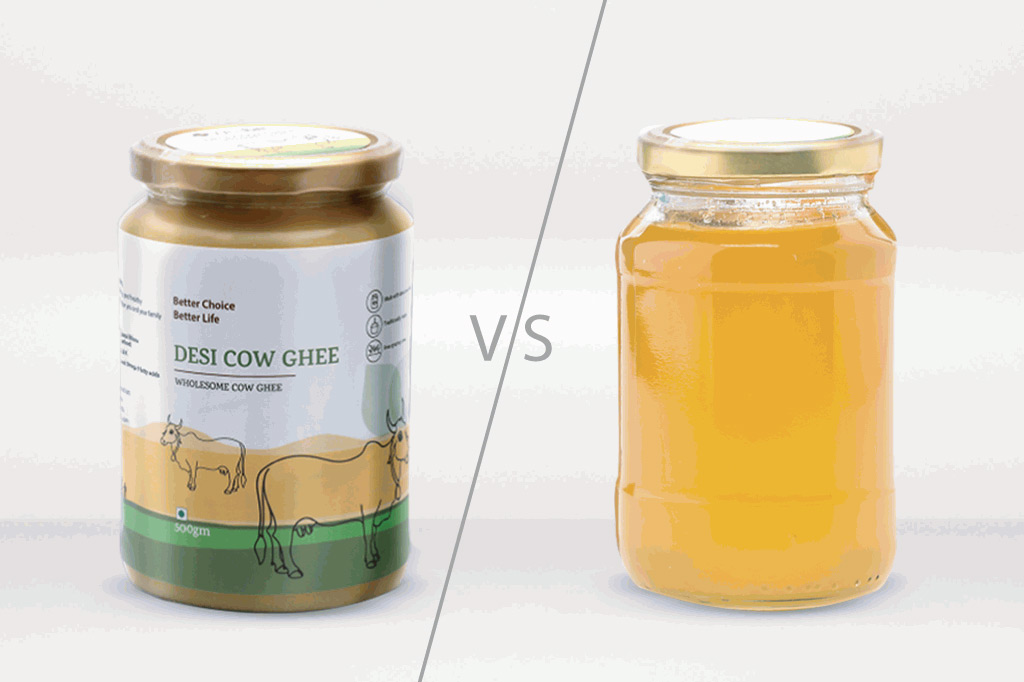
Ghee, a clarified form of butter, has been a staple in Indian cuisine for centuries. It’s revered not only for its rich, nutty flavour but also for its numerous health benefits. In recent times, the debate between A1 and A2 ghee has gained traction, leaving consumers puzzled about which is the better choice for health. In this blog post, we’ll unravel the differences between A1 and A2 ghee, exploring their health benefits and helping you make an informed decision.
What is A1 Ghee?
A1 ghee is derived from cows that predominantly produce A1 beta-casein protein in their milk. This protein variant is common in cows of European descent, including Holsteins and Friesians. When A1 protein is digested, it releases a peptide called beta-casomorphin-7 (BCM-7), which has been associated with certain health concerns.
Health Considerations with A1 Ghee
Digestive Sensitivity: Some individuals may experience digestive discomfort after consuming A1 ghee due to the presence of BCM-7.
Inflammatory Response: Studies suggest that BCM-7 might trigger low-grade inflammation in certain individuals, potentially contributing to health issues.
Possible Associations: Some studies have suggested a link between A1 beta-casein consumption and increased risks of certain health conditions. However, more research is needed to establish concrete causality.
What is A2 Ghee?
A2 ghee, on the other hand, is produced from cows that primarily produce A2 beta-casein protein in their milk. This protein variant is found in indigenous cow breeds like Gir, Sahiwal, and Desi cows. A2 milk and products are believed to be closer to the milk consumed by our ancestors.
Health Benefits of A2 Ghee
Easier Digestibility: A2 ghee is believed to be easier to digest, making it a suitable option for individuals who may have digestive sensitivities to A1 protein.
Rich in Nutrients: Like A1 ghee, A2 ghee is a source of essential nutrients like vitamins A, D, E, and K, along with healthy fats.
Potential Anti-Inflammatory Properties: Some studies suggest that A2 milk and its products, including ghee, may have anti-inflammatory properties.
Traditional Wisdom: Indigenous cow breeds have been a part of Indian culture for centuries, and their milk, considered A2, is believed to be more aligned with traditional dietary practices.
Making the Healthier Choice
When it comes to choosing between A1 and A2 ghee, it’s essential to consider your individual health profile and preferences. If you experience digestive discomfort after consuming dairy or are concerned about potential health implications associated with A1 protein, opting for A2 ghee might be a prudent choice.
Buying Pure A2 Ghee Online
In today’s digital age, accessing fresh organic cow ghee has become more convenient than ever. If you are looking to Buy the Best A2 Cow Ghee In India look no further than Happy Harvest Farms! Our WellBe Desi Cow Ghee is made from milk sourced from desi Hallikar cows. It is hand-churned using the Bilona method, which means no compromise on the nutritional quality, flavour and aroma!
Both A1 and A2 ghee have their merits, and the choice ultimately depends on individual health considerations and preferences. If you’re looking for a ghee option that aligns with traditional practices and may be easier on digestion, A2 ghee could be the better choice for you. Remember to source your ghee from trustworthy platforms like Happy Harvest Farms to ensure you’re getting the best quality products. Enjoy the rich flavour and health benefits of ghee in your diet!